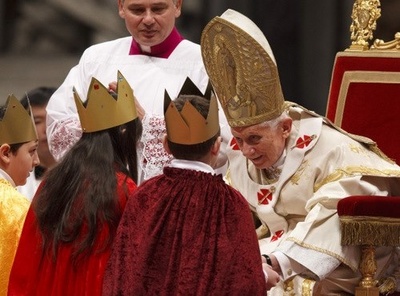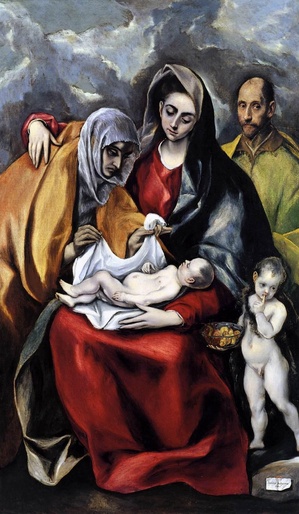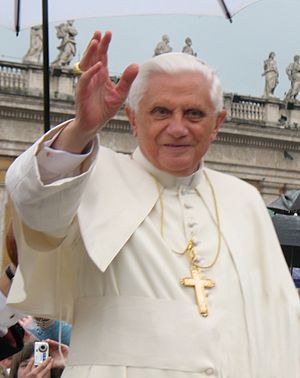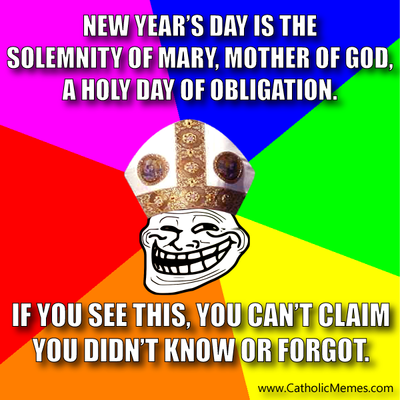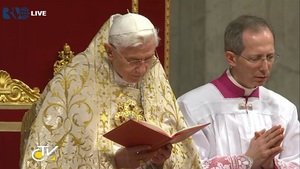The Pope meets the Kings on January 1.
The saint and his bear: Saint Seraphim of Sarov
Several years ago I was introduced to the figure of Saint Seraphim of Sarov ((1759-1833). He was a monk, priest, hermit and ascetic. He was known for his wisdom and humanity. In the Orthodox church he held the title of “startsy,” that is, a charismatic elder (in the strict sense of the word) “anointed” by the Holy Spirit with the gifts of prophesy, healing, discernment of God’s will. Saint Seraphim, you might say, was a spiritual father.
There is a story about Saint Seraphim that gives an interesting side to the man. It reads something to this effect,
“Two nuns from a
certain convent once came to visit Saint Seraphim. Suddenly a bear lumbered
unexpectedly out of the woods and frightened the visitors with his appearance.
“Misha,” – said the saint, – “why do you frighten the poor orphans! Go back and
bring us a treat, otherwise I have nothing to offer to my guests.” Hearing
these words, the bear went back into the woods, and two hours later he tumbled
into the holy elder’s cell and gave him something covered with leaves. It was a
fresh honeycomb of purest honey. Father Seraphim took a piece of bread from his
bag, gave it to the bear, pointed to the door – and the bear left immediately.”
I wonder if Saint Seraphim is invoked by those who have troubled bears? I am sure his guidance would be helpful.
Peace with God firmly linked with faith, Pope preaches on Jan. 1
Do you ever ask what peace really is? What are the horizons of peace? Why is the name of Jesus held holy, revered, not to be easily used in common speech? What brings every man, woman and child peace? Who is Mary, and why is she important? Pope Benedict answers these questions in a homily at a Mass he celebrated today to mark the New Year, the World Day of Peace, the solemnity of Mary, the Holy Mother of God.
“May God bless
us and make his face to shine upon us.” We proclaimed these words from Psalm 66
after hearing in the first reading the ancient priestly blessing upon the
people of the covenant. It is especially significant that at the start of every
new year God sheds upon us, his people, the light of his Holy Name, the Name
pronounced three times in the solemn form of biblical blessing. Nor is it less
significant that to the Word of God – who “became flesh and dwelt among us” (Jn
1:14) as “the true light that enlightens every man” (1:9) – is given, as
today’s Gospel tells us, the Name of Jesus eight days after his birth (cf. Lk
2:21).
It is in this Name that we are gathered here today. I cordially greet
all present, beginning with the Ambassadors of the Diplomatic Corps accredited
to the Holy See. I greet with affection Cardinal Bertone, my Secretary of
State, and Cardinal Turkson, with all the officials of the Pontifical Council
for Justice and Peace; I am particularly grateful to them for their effort to spread
the Message for the World Day of Peace, which this year has as its theme
“Blessed are the Peacemakers”.
Continue reading Peace with God firmly linked with faith, Pope preaches on Jan. 1
Mary, the Holy Mother of God
St Benedict’s Prologue to the Holy Rule: orienting 2013
The new year needs a proper orientation: may I propose that we need to listen, that is, to be silent (once in a while) and to attend to what the Lord, the Church, friends and family are saying. Here I think we would do well to hear what a master has to say about our work. A few years ago Pope Benedict spoke about an ancient form of the spiritual life, Benedictinism, that is often misunderstood, and yet it corresponds to the heart. Known as the Patriarch of Western monasticism, Benedict of Nursia, is the father of compassion, a man of blessing, a forthright teacher. The Pope said that,
St. Benedict’s spirituality was not an interiority removed from reality. In the anxiety and confusion of his day, he lived under God’s gaze and in this very way never lost sight of the duties of daily life and of man with his practical needs. Seeing God, he understood the reality of man and his mission” (April 9, 2008).
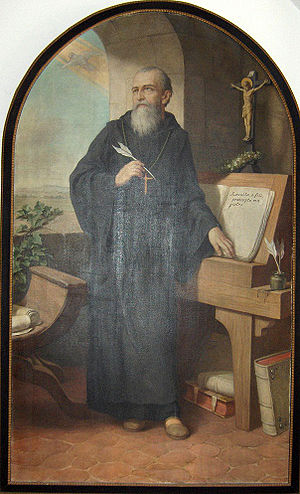
Saint Benedict of Nursia writing his Rule ~a 1929 portrait at Heiligenkreuz Abbey, Austria by Herman Nieg.
L I S T E N carefully, my child, to your master’s
precepts, and incline the ear of your heart (Prov. 4:20). Receive willingly and
carry out effectively your loving father’s advice, that by the labor of
obedience you may return to Him from whom you had departed by the sloth of
disobedience.
be, who are renouncing your own will to do battle under the Lord Christ, the
true King, and are taking up the strong, bright weapons of obedience.
of all, whatever good work you begin to do, beg of Him with most earnest prayer
to perfect it, that He who has now deigned to count us among His children may
not at any time be grieved by our evil deeds. For we must always so serve Him with
the good things He has given us, that He will never as an angry Father
disinherit His children, nor ever as a dread Lord, provoked by our evil actions,
deliver us to everlasting punishment as wicked servants who would not follow
Him to glory.
Pope Benedict’s prayer intentions for January 2013
The first day of each month I will publish Pope
Benedict XVI’s prayer intentions for the year 2013. You will notice that the
2013 intentions include prayers for praying for the Year of Faith, World
Youth Day, global respect for human life and the environment and a prayer
request for the protection of families.
Sacred Heart of Jesus.
on a daily basis.
Christians may deepen their knowledge of the mystery of Christ and joyfully
bear witness to the gift of faith in Him.
Christian communities of the Middle East, which frequently suffer
discrimination, may receive the strength of fidelity and perseverance of the
Holy Spirit.
Go to Mass on New Year’s Day
Benedict XVI’s Year’s end Vespers homily
The Pope’s homily for Vespers at the Vatican basilica follows below. He sets out a very clear direction for Christian living and pastoral activity. Are we going to listen? The Pope preached:
I thank all of
you who have chosen to participate in this liturgy of the last hour of the year
of the Lord 2012. This “hour” bears a particular intensity and becomes, in a
sense, a synthesis of all the hours of the year that is about to come to an
end. I cordially greet the Cardinals, Bishops, Priests, consecrated persons and
lay faithful, and especially the many people from the ecclesial community of
Rome. In a special way I greet the Authorities present, beginning with the
Mayor of the City, and thank them for choosing to share with us this moment of prayer
and thanksgiving to God.
A Te Deum in thanksgiving for 2012 and for 2013
Sing the Te Deum in thanksgiving for the past year and the Veni Creator for new year, and gain a
plenary indulgence.
In the Enchiridion Indulgentiarum, 4th edition, 26:
§ 1. A plenary indulgence is granted to the Christian faithful who, in a
church or in an oratory, are present [take part] in a recitation or solemn
chant of: …1° the hymn Veni Creator … on the first day of the year, imploring divine assistance for the whole of the coming year…
2° the Te Deum hymn, on the last day of the year, in
thanksgiving to God for the favors received in the course of the entire year.
The Holy Family of Nazareth: an ‘incomparable gift from God’
Today is the
feast of the Holy Family of Nazareth. In the liturgy the passage from Luke’s
Gospel presents the Virgin Mary and St. Joseph who, faithful to tradition, go
to Jerusalem for the Passover with the twelve-year-old Jesus. The first time
Jesus had entered the Temple of the Lord was forty days after his birth, when
his parents had offered “a pair of turtledoves or two young pigeons”
(Luke 2:24) on his behalf, which is the sacrifice of poor. “Luke, whose
Gospel is filled with a whole theology of the poor and poverty, makes it clear
… that Jesus’ family was counted among the poor of Israel; he helps us to
understand that it was there among them where the fulfillment of God’s promise
matured” ( The Infancy Narratives, 96). Today Jesus is in the Temple
again, but this time he has a different role, which involves him in the first
person. He undertakes the pilgrimage to Jerusalem as prescribed by the Law (Ex
23.17, 34.23 ff) together with Mary and Joseph, although he was not yet in his
thirteenth year: a sign of the deep religiosity of the Holy Family. But when
his parents return to Nazareth, something unexpected happens: he, without
saying anything, remains in the City. For three days, Mary and Joseph search
for him and find him in the Temple, speaking with the teachers of the Law (Lk
2: 46 ,47), and when they ask him for an explanation, Jesus tells them they
have no cause to wonder, because that is his place, that is his home, with the
Father, who is God (The Infancy Narratives 143). “He – Origen writes –
professes to be in the temple of his Father, the Father who has revealed
Himself to us and of which he says he is the Son” (Homilies on the Gospel
of Luke, 18, 5).
Continue reading The Holy Family of Nazareth: an ‘incomparable gift from God’
